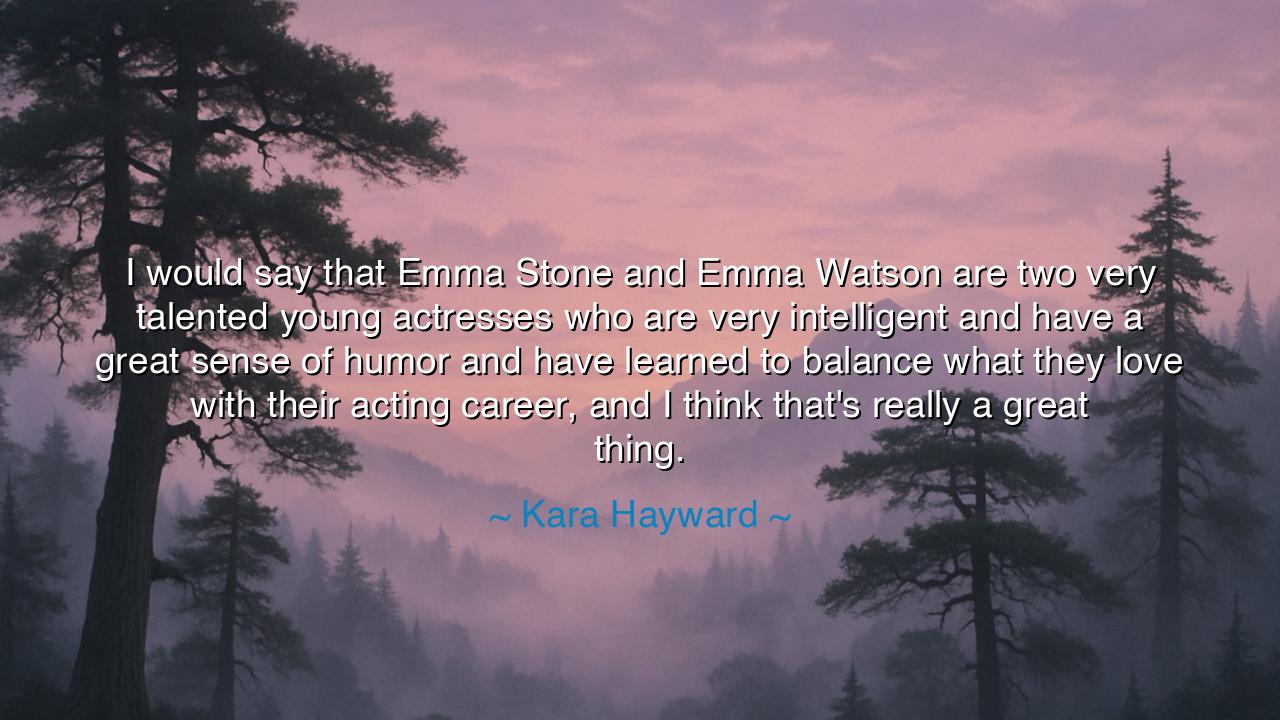
I would say that Emma Stone and Emma Watson are two very talented
I would say that Emma Stone and Emma Watson are two very talented young actresses who are very intelligent and have a great sense of humor and have learned to balance what they love with their acting career, and I think that's really a great thing.






When Kara Hayward said, “I would say that Emma Stone and Emma Watson are two very talented young actresses who are very intelligent and have a great sense of humor and have learned to balance what they love with their acting career, and I think that's really a great thing,” she was not merely offering a compliment—she was acknowledging a rare harmony of life. Within her words lies an ancient truth: that talent alone is not greatness, and ambition without balance leads only to emptiness. True mastery of the self, as of any art, lies in the ability to balance passion with peace, work with joy, and achievement with humanity. Hayward’s words are not just about the art of acting—they speak to the art of living itself.
The origin of this reflection comes from Hayward’s own journey as an actress who began working in the world of film at a young age, much like the two women she praises. To speak of Emma Stone and Emma Watson is to speak of artists who embody not only brilliance but wisdom—those who walk the perilous path of fame and yet do not lose their souls to its glare. Hayward sees in them what many seek but few find: a graceful equilibrium between the inner self and the outer world. For in a world that exalts ambition above all else, those who can remain grounded in their truth are as rare as constellations that do not drift.
When she calls them “very intelligent” and notes their “great sense of humor,” Hayward touches on virtues older than art itself. Intelligence without humility becomes pride, but when joined with humor, it becomes light—a light that warms rather than blinds. Humor, in its purest form, is wisdom smiling. It is the quiet recognition that even in struggle, joy remains possible. Both Stone and Watson carry that gift: the ability to laugh at themselves, to remain human amid applause. This balance of brilliance and levity is what allows their talent to endure, for laughter purifies the heart and frees it from vanity.
To balance what one loves with one’s career is no small feat. Many have been consumed by their craft, mistaking obsession for devotion. Yet Hayward praises those who remember to live as well as to labor. For the soul must not be chained, even to its own passion. Consider Leonardo da Vinci, whose genius was matched only by his curiosity. Though he could have devoted his life solely to painting, he also explored science, anatomy, and the mechanics of flight. His greatness was not born from obsession alone, but from his harmony with wonder itself. He understood what Hayward celebrates: that to be whole, one must cultivate both craft and spirit.
The ancients would have called this balance sophrosyne—the harmony of the soul, the equilibrium between thought, emotion, and action. In this way, Hayward’s praise of these actresses becomes a timeless teaching: that the pursuit of excellence must never destroy the joy of existence. Emma Watson, for instance, balanced her life as an actress with education and activism, proving that art and intellect are not rivals but allies. Emma Stone, with her humor and humility, reminds the world that authenticity is the truest form of beauty. Both women embody the sacred rhythm of life that moves between effort and ease, between ambition and laughter.
From this reflection we learn that talent is not the measure of a person’s greatness—it is their balance that defines them. The mind must not outshine the heart, nor the will consume the spirit. The one who burns too brightly risks burning out; the one who paces their flame keeps it alive for generations. The wise do not choose between art and life—they weave them together until they are inseparable. To live well is to honor one’s calling without being enslaved by it. This is the true mastery that Hayward honors: not fame, but fulfillment.
And so, my children of craft and passion, take this lesson as a lantern for your own journey: do not lose yourself in your pursuit of greatness—let your pursuit refine you, not consume you. Cultivate intelligence, but temper it with humor; seek success, but protect your peace. In your work, find joy; in your joy, find meaning. Let your days be a dialogue between what you do and who you are, until your life itself becomes a work of art. For as Kara Hayward reminds us, those who learn to balance what they love with what they do walk not just the path of achievement—but the path of wisdom.
Remember this: the greatest performance is not given upon a stage, nor captured by applause—it is lived. Let your life, like theirs, be the union of passion and peace, ambition and laughter, brilliance and grace. In that union lies the secret of enduring greatness.






AAdministratorAdministrator
Welcome, honored guests. Please leave a comment, we will respond soon